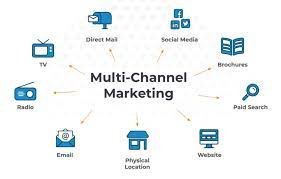Multichannel marketing integration is essential for businesses to create cohesive and consistent marketing experiences across multiple channels, such as email, social media, websites, and mobile apps. By integrating marketing efforts across various channels, businesses can reach a broader audience, increase brand visibility, and drive customer engagement and loyalty. Here are some strategies for effectively integrating multichannel marketing:
1. Define Clear Objectives and Goals
Start by defining clear objectives and goals for your multichannel marketing efforts. Determine what you want to achieve, whether it’s increasing brand awareness, driving website traffic, generating leads, or boosting sales. Align your objectives with your overall marketing strategy and business goals to ensure coherence and focus across all channels.
2. Understand Your Audience and Their Preferences
Gain a deep understanding of your target audience and their preferences across different channels. Conduct market research, analyze customer data, and gather insights into their behavior, interests, and preferences. Use this information to tailor your messaging, content, and offers to resonate with your audience on each channel effectively.
3. Create Consistent Brand Messaging and Visual Identity
Maintain consistency in your brand messaging and visual identity across all channels to ensure a seamless and cohesive brand experience for your audience. Develop brand guidelines that outline your brand voice, tone, values, and visual elements, such as logos, colors, and typography. Apply these guidelines consistently across all marketing materials and channels to reinforce your brand identity and messaging.
4. Implement Integrated Marketing Technology and Tools
Invest in integrated marketing technology and tools that enable seamless communication and coordination across multiple channels. Choose a marketing automation platform that centralizes data, workflows, and campaigns, allowing you to manage and track multichannel marketing activities effectively. Integrate your CRM system, email marketing software, social media management tools, and analytics platforms to streamline processes and gain actionable insights into your marketing efforts.
5. Coordinate Campaigns and Messaging Across Channels
Coordinate your marketing campaigns and messaging across different channels to deliver a unified and cohesive brand experience to your audience. Develop integrated marketing campaigns that leverage multiple channels to reach and engage your target audience at various touchpoints along their customer journey. Ensure consistency in messaging, timing, and creative elements across all channels to reinforce your brand message and maximize impact.
6. Optimize for Mobile and Cross-Device Experiences
Optimize your marketing efforts for mobile devices and cross-device experiences to reach consumers wherever they are. Design responsive and mobile-friendly websites, emails, and ads that provide a seamless and engaging experience across different devices and screen sizes. Leverage location-based targeting, mobile apps, and SMS marketing to deliver personalized and relevant messages to mobile users in real-time.
7. Measure and Analyze Multichannel Performance
Track and measure the performance of your multichannel marketing efforts using key performance indicators (KPIs) and analytics tools. Monitor metrics such as website traffic, engagement rates, conversion rates, and customer lifetime value across different channels to evaluate the effectiveness of your campaigns. Use A/B testing, attribution modeling, and marketing analytics to identify trends, optimize campaigns, and allocate resources effectively.
8. Continuously Adapt and Iterate
Stay agile and responsive to changes in consumer behavior, market trends, and technological advancements by continuously adapting and iterating your multichannel marketing strategies. Monitor industry developments, competitor activities, and customer feedback to identify opportunities and challenges in the market. Experiment with new channels, tactics, and technologies to stay ahead of the curve and drive innovation in your multichannel marketing efforts.
Conclusion
Multichannel marketing integration requires careful planning, coordination, and execution to deliver consistent and compelling brand experiences across multiple channels. By defining clear objectives, understanding your audience, maintaining consistent messaging and visual identity, leveraging integrated marketing technology, coordinating campaigns across channels, optimizing for mobile and cross-device experiences, measuring performance, and continuously adapting and iterating your strategies, you can create a cohesive and effective multichannel marketing strategy that drives engagement, loyalty, and business growth. Embrace the power of multichannel marketing integration to reach and connect with your audience wherever they are and drive meaningful results for your business.






